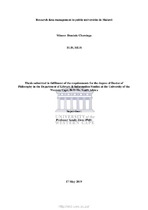| dc.description.abstract | The emergence and subsequent uptake of Information and Communication Technologies has
transformed the research processes in universities and research institutions across the globe.
One indelible impact of Information and Communication Technologies on the research process
is the increased generation of research data in digital format.
This study investigated how research data has been generated, organised, shared, stored,
preserved, accessed and re-used in Malawian public universities with a view to proposing a
framework for research data management in universities in Malawi. The objectives of the
study were: to determine research data creation, sharing and re-use practices in public
universities in Malawi; to investigate research data preservation practices in public universities
in Malawi; to investigate the competencies that librarians and researchers need to effectively
manage research data; and to find out the challenges that affect the management of research
data in public universities in Malawi.
Apart from being guided by the Community Capability Model Framework (Lyon, Ball, Duke
& Day, 2011) and Data Curation Centre Lifecycle Model (Higgins, 2008), the study was
inspired by the pragmatic school of thought which is the basis for a mixed methods research
enabling the collection of quantitative and qualitative data from two purposively selected
universities. A census was used to identify researchers and librarians while purposive sampling
was used to identify directors of research. Questionnaires were used to collect mostly
quantitative and some qualitative data from 36 librarians and 187 researchers while interviews
were conducted with directors of research. The Statistical Package for the Social Sciences was
used to analyse the quantitative data by producing percentages, means, independent samples ttest
and one-way analysis of variance. Thematic analysis was used to analyse the qualitative
data. | en_US |

